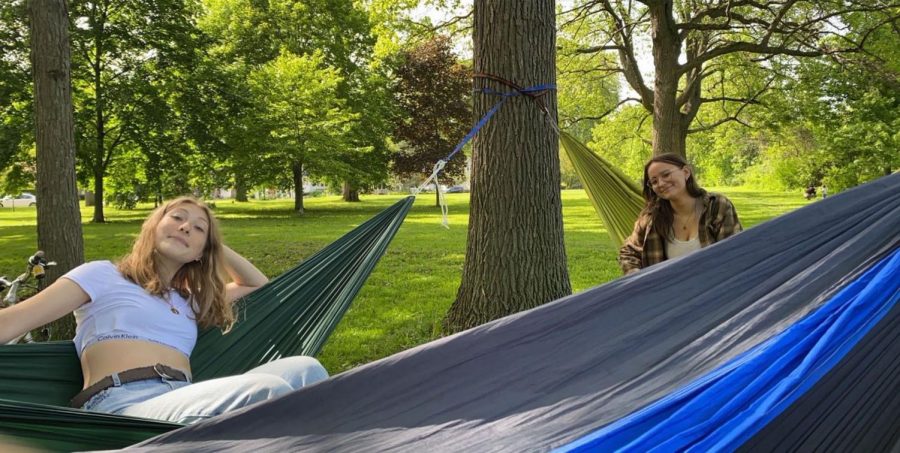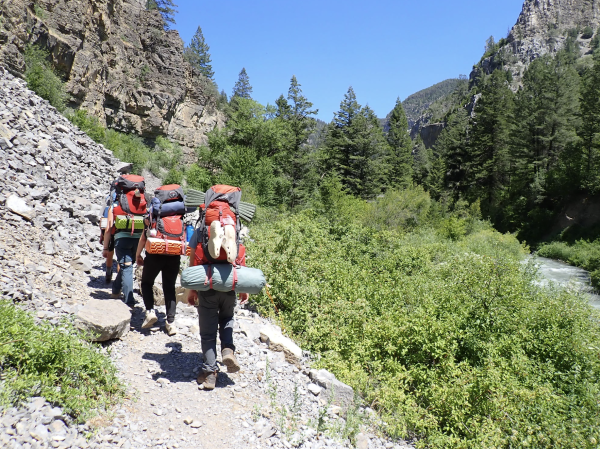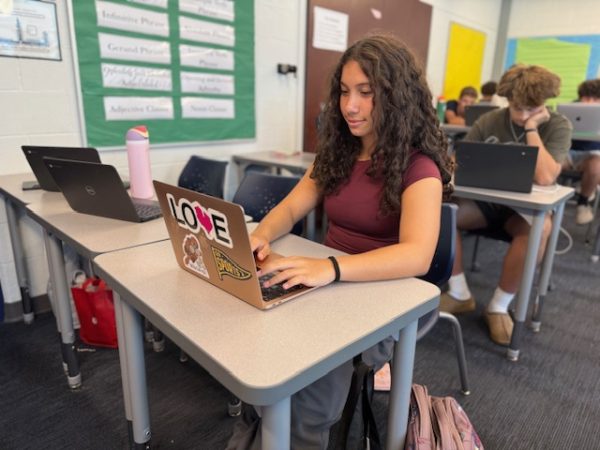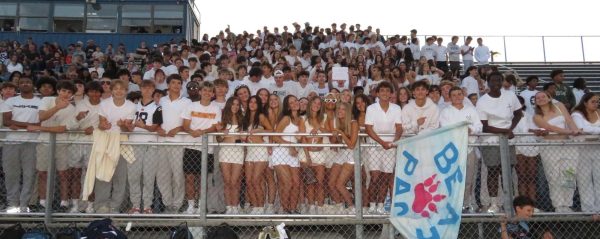COVID-19: A Year of Self Reflection
Skylar and her friends a few months into quarantine, social distancing in a park.
Just a few weeks ago, after we hit the one year mark of the first “two week” COVID shutdown, I couldn’t help but be reminded of the plot of the movie Groundhog Day. In this film, Bill Murray’s character, Phil Conners, is a cynical, cold hearted, and self loathing TV weatherman, with a bad attitude towards everyone and everything. Traveling to the small town of Punxsutawney to report about Groundhogs Day, he gets to the town, and puts no effort into trying to hide his pure hatred of the little city and everyone in it. Once there, he finds himself trapped, repeating the same day over and over again, ultimately learning that the only way to escape his spiraling negativity, is to change his attitude and outlook on the world. By the end, Phil escapes the cycle by learning to live beyond his own selfish basic needs, altering his attitude towards the world and his reluctance to reshape himself and his personality.
Throughout this year, many of us found ourselves feeling the same; stuck in an endless loop of reliving the same day, with no end in sight. Bill Murray said it best when he asked, “What would you do if you were stuck in one place… And everyday was exactly the same, and nothing you did mattered?” Well, a year ago, this was our groundhog day moment. All of us had our own different experiences throughout quarantine, and I was interested to see what a few students at BHS remember from the experience, especially after the whole vacation effect had worn off.
Junior Ari Bonds states, “For the first few months after the beginning of quarantine, my routine would consist of waking up to do online courses (which were optional at the time), as well as a lot of outdoor activities. I wouldn’t say that it was too structured besides attending my classes on zoom, but going on bike rides and doing a lot of social distancing activities with friends were almost every day occurrences because those were the only things getting me out of the house at the time.” Like most others at this time, outdoor activities like Bonds said were probably some of the most common in some people’s routines.
Another student at Berkley, sophomore Ossie Cierpial states, “After the first few weeks of quarantine, my sleep schedule got to be really bad. I stayed up very late, and woke up very late. A lot of the days felt the same, and it wasn’t very fun because I couldn’t hang out with friends, and I had to be in the house all the time. Although it was all mostly very boring and repetitive, I did find a passion for making noodles of all different kinds, and I still do that to this day.” As Cierpial said, a lot of the days felt the same. But glad to see his obsession with noodles is still growing with each passing day.
Lastly, sophomore Megan Melville says, “My typical day would consist of starting off with some school work, and then mostly hanging out with my sister. Often my family and I would go on weekly trips to Kensington Park or Island lake to bike around, which made quarantine all a little bit more enjoyable. Another thing I would do a lot was reorganize/redecorate my room; I did a lot of painting my closet and walls, moving around my bed, and getting new decorations to make my room a better space, especially because I had to spend so much time in there.” Like Melville and Bonds previously mentioned, spending time outside was a very crucial part of quarantine.
In times like these, it’s very important to self reflect in order to really improve yourself as a person. For me, to push through that feeling of repetition and lack of motivation, especially in the start of quarantine, I found that doing art a helpful way to change up the cycle. Not only did doing art make me feel more productive with my day, but also encouraged me to change my bad attitude about being in quarantine, and use this opportunity to improve myself. From then on, I stayed constant with my art, and now I can look back and see how much I’ve improved throughout the course of the year.
But everyone has their own story. I was interested to see what other people remember about themselves from the first few months of quarantine, after the two week vacation effect had worn off. So, I asked some fellow students at Berkley to reminisce with me, and share their experiences.
Since studies have shown that reflection is a key step for people who desire a good relationship with themselves, Professor Graham Gibbs, from Oxford Brookes University, shared with the world his creation of his model for personal reflection, which he calls the “Reflective Cycle”. First question on the list asks respondents to describe what happened. Since we’ve all had a first hand experience from the start of the Coronavirus pandemic, to the end, that first question answers itself.
Question one, Feelings: What were you thinking and feeling?
Freshman Joe Voss answers, “At the time, I was thinking, ‘sweet 2 weeks off of school’. But then after they announced that we weren’t going back to school the rest of the year and people had started wearing masks everywhere they went, that was when I really knew it was going to be a while before everything went back to normal. But looking back, it really doesn’t feel like it’s been a whole year like this. “
Question two, Evaluation: What was good and bad about the experience?
Junior Skylar Walter shares, “For me something that came out of this experience was having time to focus on myself and the things that are important to me. It really helped me grow and find myself. However, it was extremely difficult having to sacrifice so many things like sports, and time with my friends during this process.”
Question three, Analysis: What sense can you make of the situation?
Sophomore Reed Johnson explains, “What I saw in the whole situation, is that although we all had to split up from each other and stay isolated from everyone we know from school, we still had the opportunity to communicate with our phones especially. I feel like only the people who you are genuinely close with are the people you will keep in touch with in a time like that. It was all pretty hard to adjust to, but makes me wonder how it would have gone if this would have happened back in the day, when there were no phones or screens to entertain you with, so I can only imagine how isolated it would have been for people back then.”
Question four: Conclusion: What did you learn? What would you do differently?
Freshman Maddie Welsh explains, “During the start of quarantine I didn’t take it all very seriously because I’ve never experienced anything like this. I wish I was more careful, after many COVID scares and talks, I’ve learned that this virus is way more serious and harmful then I could have imagined.
Question five, Action: If this happened again, what would you do?
Sophomore Grace Debrect answers, “I think if I had to do something different I would go outside more and try to stay active because going from being very busy and active all the time to being trapped in my house 24/7, I can now see how it unhealthy it was, both physically and mentally.”
As demonstrated above, reflection is a key step in the process of building yourself as a person. Although the process is different for everyone, it should have shown readers how reflecting on our actions can be one of the most beneficial ways to help us identify the areas of ourselves that need change. Along with that, reflection can also help us recognize all the places we have grown so that we can keep moving forward and be the best versions of ourselves.
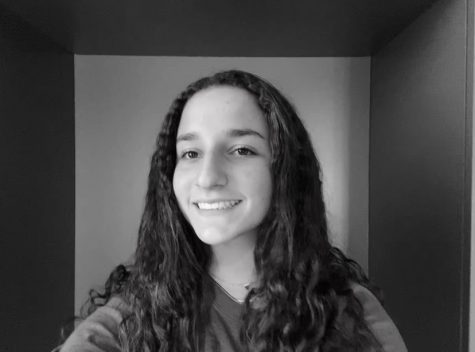
Hello all, I’m Lily Cierpial and I’m a junior this year. This is my second year on the journalism staff, and I'm so excited to be one of the two copy...


